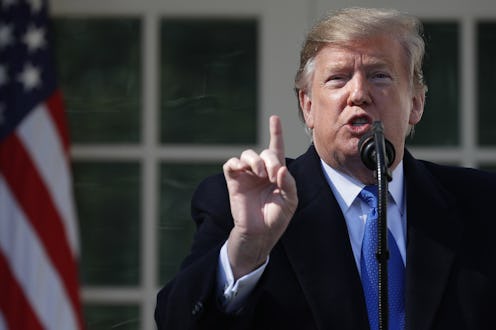News
This Is Fine: Trump Said He Didn't Need To Declare The National Emergency He Just Declared

President Donald Trump declared a national emergency in the United States on Friday in his latest attempt to secure funding for a wall along the U.S.-Mexico border. But one comment he made during the announcement lessened the sense of urgency he was assumedly trying to invoke: "I didn't need to do this," Trump said of declaring the national emergency.
The president has been fighting to get $5.7 billion appropriated for his wall, even helping incite a government shutdown to force Congress' hand (unsuccessfully). On Thursday, the legislative chambers passed funding bills that included just $1.375 billion for additional fencing along the border, per CNBC.
"I was successful in that sense," Trump declared during his Friday speech, "but I want to do it faster. I could do the wall over a longer period of time — I didn't need to do this. But I'd rather do it much faster."
People on social media quickly jumped on the remark, pointing out that it may hurt Trump's case if the emergency declaration is challenged in court, as many believe it will be. Law professor Joyce Alene called his comment "a gift to all the lawyers preparing to sue him," while legal advocate Kumar Rao described the moment as the president "beautifully and fully undercutting himself."
Scholars disagree over whether there's a solid legal argument against Trump declaring a state of emergency to build a border wall. Law professor Stephen Vladeck told NPR that because "Congress didn't define what is and what is not a national emergency," it will be difficult to prove that the current immigration situation is definitively not an emergency. Defense budget analyst Todd Harrison said attorneys may be able to make a case based on the fact that Trump's declaration appropriates money from the Department of Defense for the wall, since border security is within the purview of the Homeland Security Department.
Law professor Harry Litman wrote a The Washington Post op-ed last month suggesting that the Supreme Court might not be willing to block Trump's declaration if a legal challenge ultimately makes its way to them. Overturning his state of emergency might force the court to start "second-guessing presidential declarations, hamstringing genuinely necessary emergency powers" later, Litman argued, and so the court might maintain the declaration "so as not to clip the wings" of presidents in the future.
Regardless of what happens in the courts, Congress also has a path for reigning in a state of emergency. Members may pass a joint resolution to end it — but if the president vetoes that resolution, the chambers need a veto-proof majority to uphold it, and The New York Times reports that such a resolution is unlikely to receive that level of support right now.
It's far from certain that either the legislative or judicial branch will put a stop to Trump's state of emergency. But according to Vox, many in the president's own circle of advisers have said that they do expect, at minimum, a court injunction that would temporarily stop the building of the wall. Although that scenario wouldn't result in an immediate wall, it would allow Trump to keep firing up his base in the meantime by blaming the so-called "liberal ninth circuit" courts for impeding his agenda.
One thing does seem certain: If lawyers are able to mount a viable challenge to the state of emergency, Trump's assertion that "I didn't need to do this" won't help his case.